June 1, 2025 | 15:24 GMT +7
June 1, 2025 | 15:24 GMT +7
Hotline: 0913.378.918
June 1, 2025 | 15:24 GMT +7
Hotline: 0913.378.918
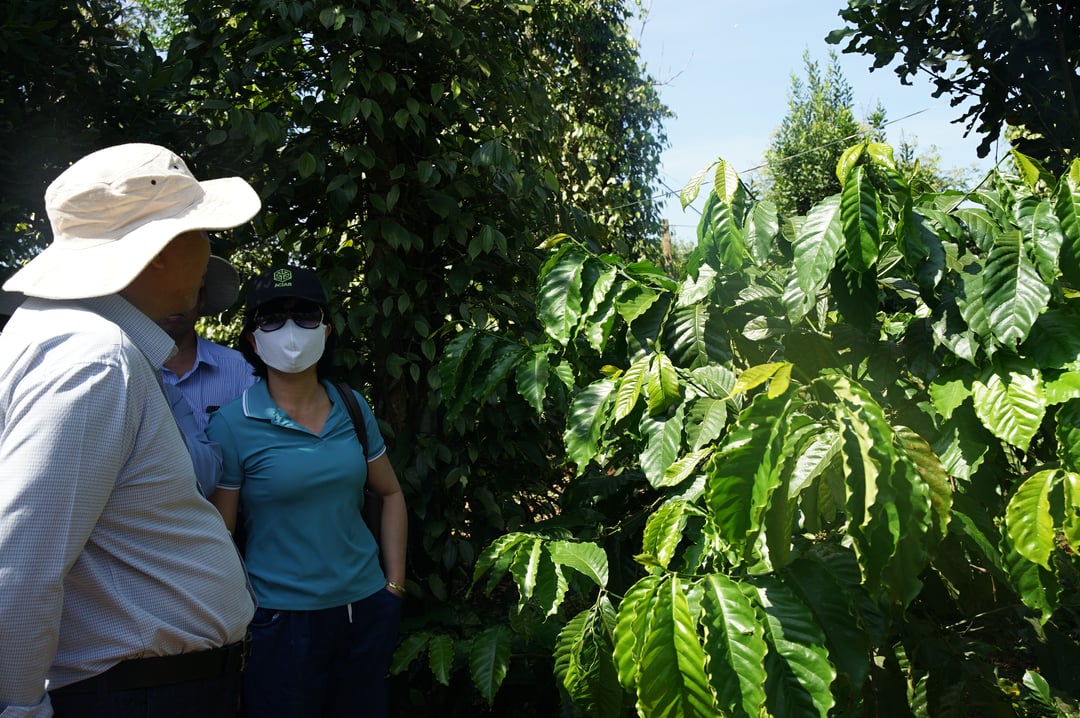
Intercropping coffee garden of householder Do Van Anh in Tan Phu village, Ea Toh commune, Krong Nang district, Dak Lak. Photo: Linh Linh.
The implementation of precision agriculture has been proposed to promote sustainable development in the cultivation of coffee and pepper. The performance of precision agriculture techniques has resulted in reduced input costs and labor requirements for coffee and pepper cultivation, thereby addressing the challenges presented by climate change.
The implementation of plant diversification practices and the reduction of input materials are essential strategies for sustainable agriculture.
The Ministry of Agriculture and Rural Development (MARD) and the Australian Centre for International Agricultural Research (ACIAR) have established a 10-year strategic plan for the period of 2017-2027, which designates the Central Highlands as one of the priority areas for the advancement of research and cultivation techniques in the agriculture and forestry subsectors.
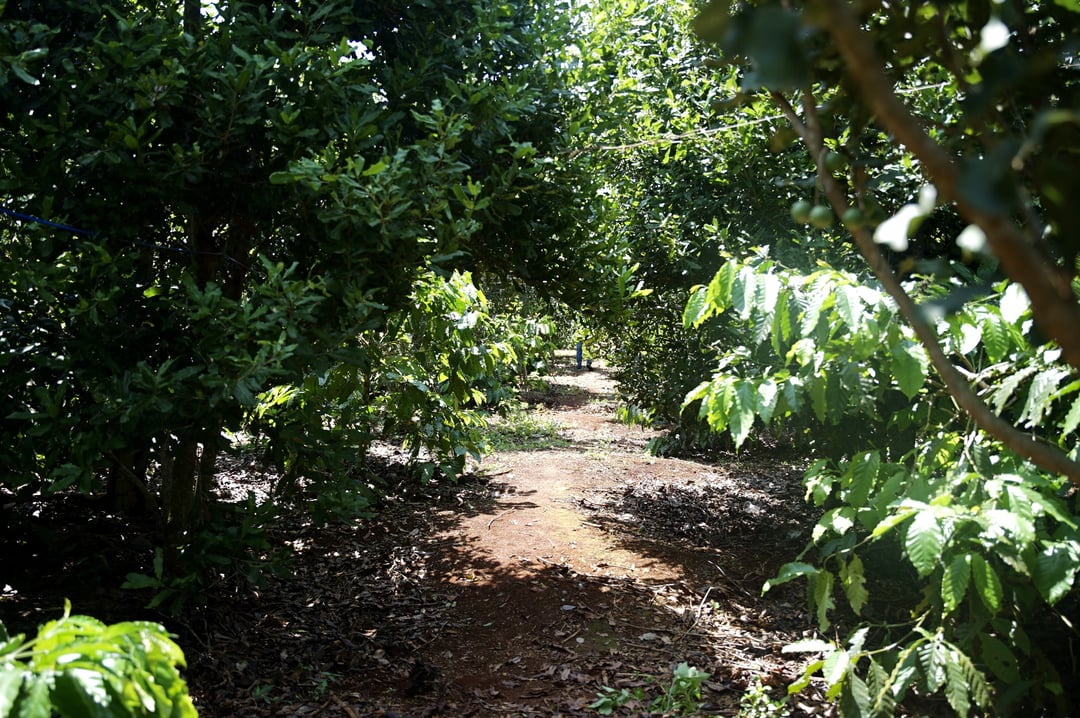
Coffee is intercropped with pepper, macadamia, and durian plants among others. Photo: Linh Linh.
The Central Highlands region is recognized as the main producer of numerous industrial crops, such as coffee and pepper, which constitute 88% and 63% respectively. Research indicates that there has been a significant surge in the cultivation of coffee and pepper crops, with people extensively expanding their agricultural operations onto unsuitable topography and soil, thereby causing a disturbance in the ecological balance.
According to Dr. Phan Viet Ha, the Deputy Director of the Western Highlands Agriculture and Forestry Science Institute (WASI), coffee and pepper showed significant progress in terms of cultivation techniques, which have been successfully mastered thus far. There are, however, some ongoing issues that need to be resolved, such as the issue of viruses and pests that affect coffee and pepper underground.
The WASI representative highlighted certain deficiencies in the cultivation of coffee and pepper, including the potential obstacles posed by climate change and the potential scarcity of labor in the years to come. Furthermore, the soil undergoes degradation due to continuous cultivation, resulting in soil acidity, organic matter depletion, soil texture loss, and nutrient depletion. This degradation reduces soil health, leading to ineffective crop yields and precarious agricultural productivity.
The project titled "Enhancing smallholder livelihoods in the Central Highlands of Vietnam through Improving the Sustainability of Coffee and Pepper farming systems and value chains (V-SCOPE)" was initiated to address shortcomings in the unsustainable coffee and pepper production system in the Central Highlands.
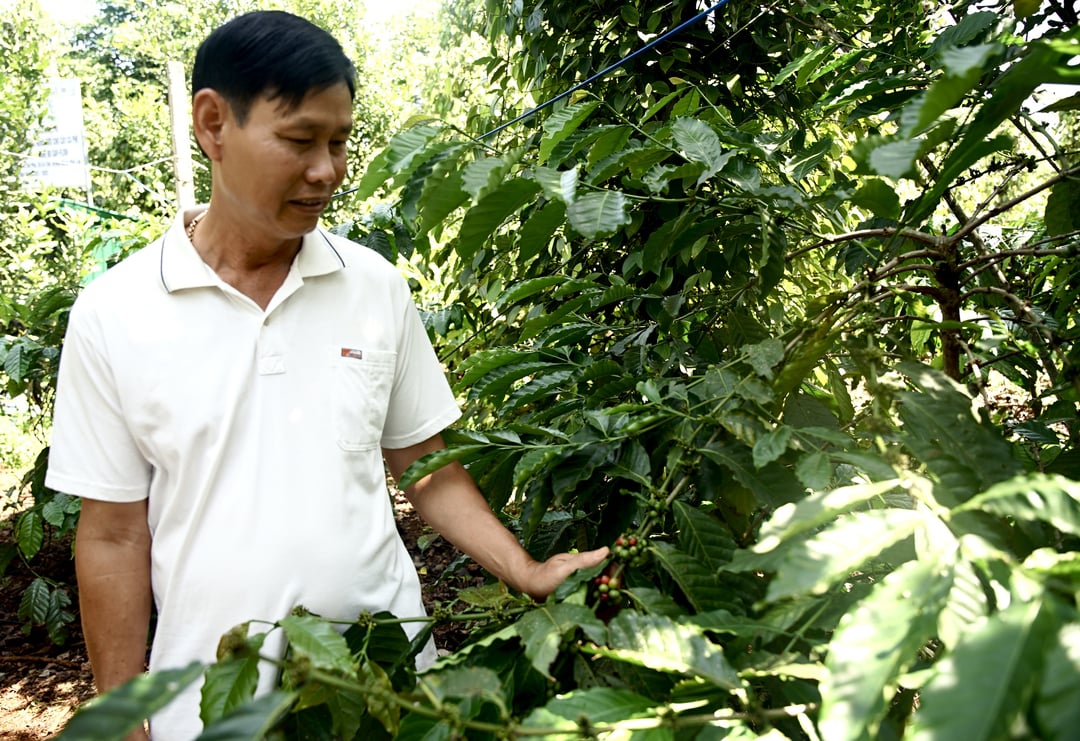
Do Van Anh shared that intercropping coffee, pepper, and fruit trees require cheaper input costs and helps avoid income risks when coffee prices are unstable. Photo: Linh Linh.
This project aims to identify strategies for implementing sustainable approaches to pest and disease management. The objectives include reducing input costs, enhancing production efficiency, and optimizing the production chain to increase product value.
According to Ms. Chau Thi Minh Long, the Deputy Head of the Faculty of Agricultural Systems at WASI, initial results from four experiments measuring nutrient leaching and thirty trials on soil restoration using lime and biochar in coffee and pepper farming suggest that this study could act as a foundation for proposing optimal fertilizers for crops, thereby conserving resources and safeguarding the environment.
The project's framework has demonstrated favorable outcomes through the transition from intensive farming to intercropping of coffee, pepper, and fruit trees. These outcomes include increased plant densities, higher accumulated yields, and equivalent input, while simultaneously enhancing profitability and adaptability.
This project has been financially supported by the Australian Center for International Agricultural Research (ACIAR), and is being conducted in collaboration with the World Agroforestry Center (ICRAF) in Vietnam, the French Centre of International Research on Agriculture for Development (CIRAD), as well as various research and private partners.
The project is set to be carried out across three provinces, namely Dak Lak, Dak Nong, and Gia Lai, over the course of five years, from 2021 to 2025. The project is expected to involve the active participation of approximately 300 farmers who specialize in coffee and pepper cultivation.
The V-SCOPE project conducted an experiment at Do Van Anh's coffee garden located in Tan Phu village, Ea Toh commune, Krong Nang district, Dak Lak, utilizing SAP-FLOW measurement technology to explore the water requirements of coffee plants.
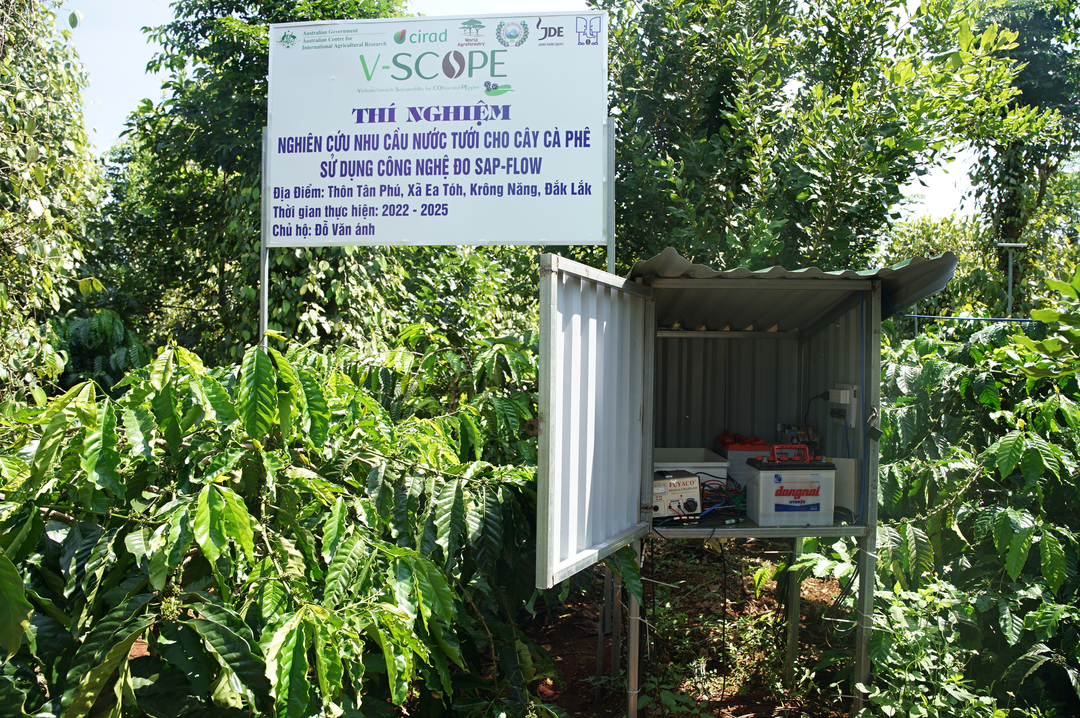
Experiment to study water demand for coffee plants using SAP-FLOW measurement technology. Photo: Linh Linh.
Climate change and insufficient irrigation water during the dry season pose significant challenges in these days, particularly for the coffee and pepper industries. Historically, Vietnam has conducted numerous studies on irrigation and technical procedures, producing recommendations that align closely with practical applications. According to Dr. Phan Viet Ha, it is imperative to conduct research aimed at enhancing irrigation practices and establishing benchmarks that can efficiently preserve water resources.
The aforementioned research endeavor constitutes a primary component of the V-SCOPE initiative, which has received financial support from ACIAR. Mr. Ha stated that a significant and pressing challenge facing agriculture in the Central Highlands both presently and in the foreseeable future pertains to the issue of irrigation water.
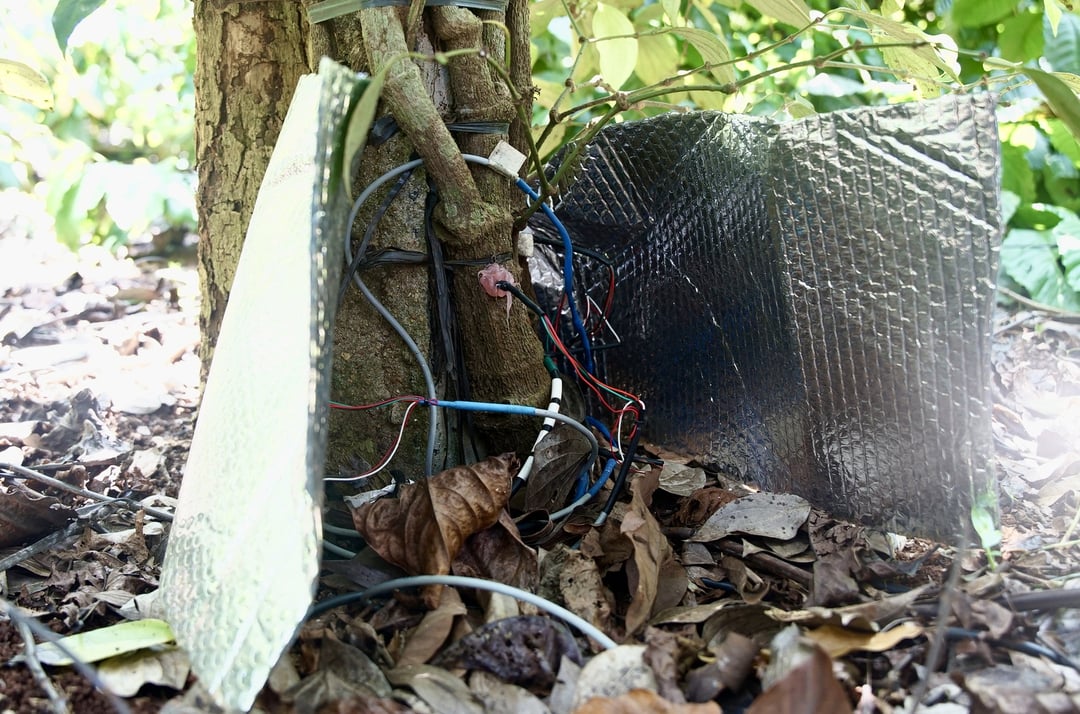
The sap flow measurement system is installed in some coffee and pepper trees, helping to calculate the exact amount of water the plant uses at different times. Photo: Linh Linh.
Through the implementation of experiments utilizing a tree sap flow measurement system, it becomes feasible to accurately quantify the quantity of water utilized by plants at varying intervals. This data can then be utilized to perform specific calculations and determine optimal irrigation strategies, thereby minimizing losses during periods of drought, in accordance with the principles of precision agriculture.
Dr. Phan Viet Ha has reported that the experiment comprises multiple devices within the system, including a tree sap flow measuring device, which is integrated with a garden microclimate system to manage the correlation. The cost of the tree sap flow measurement system is relatively high, ranging from 4,000 to 5,000 USD, but with the system measuring microclimate conditions, it is quite affordable, about less than 1,000 USD. After ending the research, the production guidance can rely solely on the empirical findings of the experiment and the meteorological station data to make precise determinations regarding irrigation.
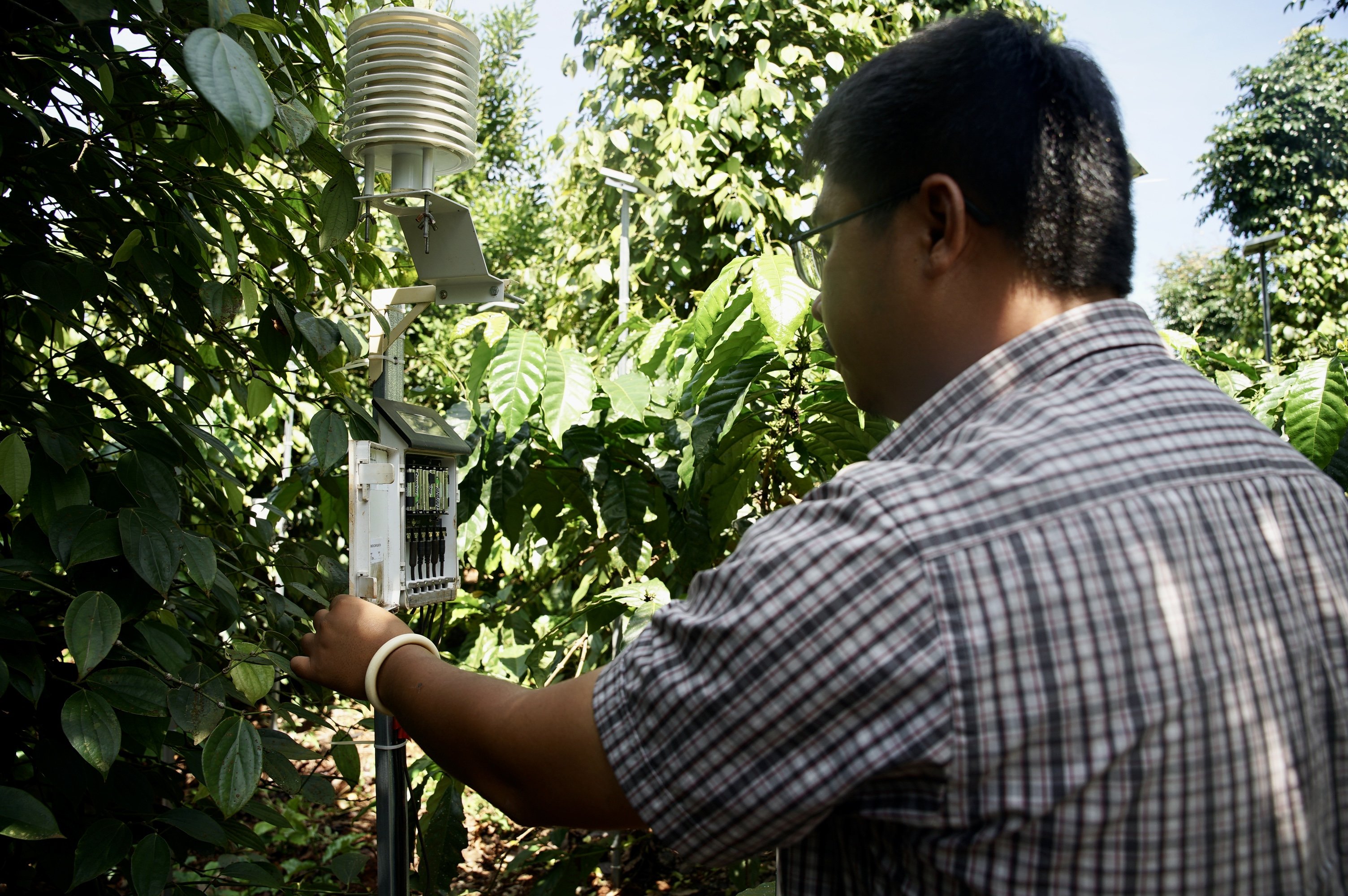
The technical staff operates the microclimate measurement equipment. Photo: Linh Linh.
The aforementioned experiments are conducted by researchers from ICRAF, CIRAD, and the Central Highlands Agro-Forestry Science and Technology Institute. The control center system utilizes a sensor system to establish a connection with a series of sensors that gauge the sap flow in each tree trunk. The collected data is then transmitted via cloud technology to a cloud, which is operated by experts in the field. Professionals possess the ability to analyze statistical data and formulate diverse irrigation strategies.
Dr. Nguyen Quang Tan, the National Coordinator of ICRAF, explained the significance of microclimate measurement equipment. He emphasized that the installation of meteorological stations for measuring micro-weather is aimed at localizing weather information, which enables the provision of more precise recommendations regarding the irrigation water and production requirements for specific areas and regions.
Translated by Dieu Linh

(VAN) Several scientists and farmers are experimenting with soil treatment in some key durian-growing regions such as Cai Lay (Tien Giang), Dak Song, Gia Nghia, and Dak R’lap (Dak Nong).
/2025/05/25/4127-3-073637_820.jpg)
(VAN) Thanks to the promotion from an FAO-implemented project, vegetable production in greenhouses in Moc Chau has seen strong development, from 1.5 hectares in 2021 to nearly 50 hectares in 2024.

(VAN) FAO has recently supported USD 140,000 to implement the project 'Risk mitigation human-animal interface risks through disease control initiatives in pig farming.'

(VAN) The People's Committee of Tra Vinh province has approved an adjustment to the investment policy for the Green Hydrogen Plant project, increasing its area to approximately 52.76 hectares.
![Reducing emissions from rice fields: [2] Farmers’ commitment to the soil](https://t.ex-cdn.com/nongnghiepmoitruong.vn/608w/files/news/2025/05/05/dsc08881jpg-nongnghiep-140632.jpg)
(VAN) Clean rice cultivation model in Thuong Tan commune, Bac Tan Uyen district, is assisting local residents in achieving sustainable agriculture by substantially reducing costs, increasing productivity, and protecting the environment.

(VAN) At the conference to disseminate Resolution No. 68, AgriS introduced its digital agricultural ecosystem and reaffirmed its commitment to accompanying the Government in promoting private sector development and sustainable agriculture.

(VAN) 'Blue Ocean - Blue Foods' initiative is designed to restore marine ecosystems and establish sustainable livelihoods for local communities by cultivating a minimum of 1,000 hectares of cottonii seaweed in the first three years.